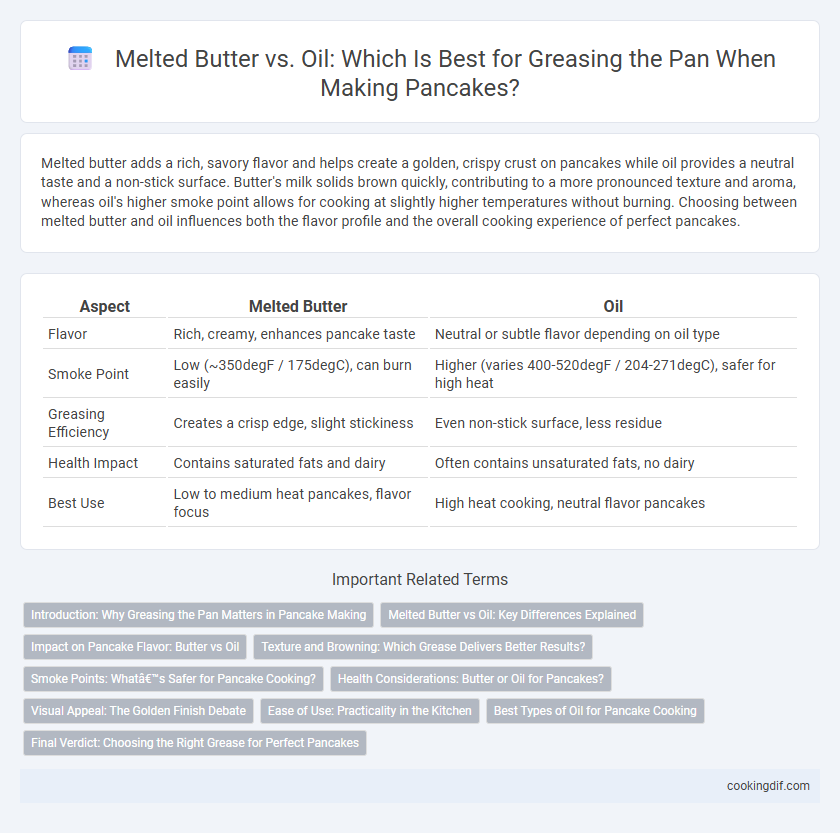Melted butter adds a rich, savory flavor and helps create a golden, crispy crust on pancakes while oil provides a neutral taste and a non-stick surface. Butter's milk solids brown quickly, contributing to a more pronounced texture and aroma, whereas oil's higher smoke point allows for cooking at slightly higher temperatures without burning. Choosing between melted butter and oil influences both the flavor profile and the overall cooking experience of perfect pancakes.
Table of Comparison
| Aspect | Melted Butter | Oil |
|---|---|---|
| Flavor | Rich, creamy, enhances pancake taste | Neutral or subtle flavor depending on oil type |
| Smoke Point | Low (~350degF / 175degC), can burn easily | Higher (varies 400-520degF / 204-271degC), safer for high heat |
| Greasing Efficiency | Creates a crisp edge, slight stickiness | Even non-stick surface, less residue |
| Health Impact | Contains saturated fats and dairy | Often contains unsaturated fats, no dairy |
| Best Use | Low to medium heat pancakes, flavor focus | High heat cooking, neutral flavor pancakes |
Introduction: Why Greasing the Pan Matters in Pancake Making
Greasing the pan with melted butter enhances the flavor and creates a golden, crispy edge on pancakes, while oil provides a neutral taste and even heat distribution. Proper greasing prevents sticking, ensuring easy flipping and maintaining the pancake's fluffy texture. Choosing between butter and oil impacts both the cooking process and the final pancake quality.
Melted Butter vs Oil: Key Differences Explained
Melted butter adds a rich, creamy flavor and helps achieve a golden, slightly crispy texture on pancakes, while oil offers a neutral taste and typically results in a softer surface. Butter contains milk solids that brown during cooking, enhancing the flavor profile, whereas oil has a higher smoke point, making it less likely to burn at high temperatures. Choosing between melted butter and oil impacts both the taste and texture, with butter favored for traditional pancakes and oil preferred for a lighter, less greasy finish.
Impact on Pancake Flavor: Butter vs Oil
Melted butter adds a rich, creamy flavor and subtle nuttiness to pancakes, enhancing their overall taste and aroma. Oil, while effective for preventing sticking, tends to impart a neutral flavor, allowing the pancake's batter taste to dominate. Choosing butter over oil for greasing the pan results in a more indulgent and flavorful pancake experience.
Texture and Browning: Which Grease Delivers Better Results?
Melted butter creates a richer flavor with a slightly crispy texture and promotes superior browning due to its milk solids caramelizing during cooking. Oil, with its higher smoke point, provides a more neutral taste and helps achieve an even, consistent golden surface without burning. For pancakes, choosing melted butter enhances taste and color, while oil offers durability for higher-heat cooking and a softer texture.
Smoke Points: What’s Safer for Pancake Cooking?
Melted butter has a lower smoke point around 350degF (175degC), making it prone to burning and producing a bitter taste when cooking pancakes at high heat. Oils such as canola or vegetable oil have higher smoke points, typically between 400degF and 450degF (204degC to 232degC), offering safer options for greasing pans to avoid smoke and maintain pancake flavor. Choosing oils with higher smoke points helps achieve even cooking without compromising taste or safety during pancake preparation.
Health Considerations: Butter or Oil for Pancakes?
Melted butter contains saturated fats and small amounts of vitamins A and D, offering a natural flavor but potentially raising cholesterol levels if consumed excessively. Oil, especially plant-based oils like olive or canola, provides healthier unsaturated fats and may support heart health while maintaining a non-stick surface. Choosing between butter and oil for greasing pancake pans depends on balancing flavor preferences with nutritional impact and dietary needs.
Visual Appeal: The Golden Finish Debate
Melted butter creates a rich, golden-brown finish on pancakes, enhancing visual appeal with its natural browning properties and slight caramelization. Oil, while preventing sticking effectively, often results in a more uniform, less vibrant surface lacking the characteristic golden hue. Choosing melted butter for greasing elevates the pancake's color and texture, making each stack visually inviting and gourmet.
Ease of Use: Practicality in the Kitchen
Melted butter offers a rich flavor but can burn quickly, requiring careful temperature control when greasing the pan for pancakes. Oil provides a higher smoke point and spreads evenly without burning, making it more practical for consistent non-stick performance. Choosing oil enhances ease of use by reducing the risk of burnt residue and simplifies quick, efficient cooking.
Best Types of Oil for Pancake Cooking
Using oils with high smoke points such as canola, vegetable, or sunflower oil ensures even cooking and prevents burning when greasing the pan for pancakes. Coconut oil adds a subtle flavor and healthy fats, while avocado oil offers a neutral taste and excellent heat stability. Avoid butter for greasing to reduce the risk of burning and achieve consistent pancake texture and color.
Final Verdict: Choosing the Right Grease for Perfect Pancakes
Melted butter imparts a rich, nutty flavor and creates a golden, crispy edge on pancakes, while oil ensures even heat distribution and prevents sticking without altering taste. For perfectly golden pancakes with a slightly caramelized texture, melted butter is ideal, especially at medium heat. Use oil when seeking a neutral taste and minimal browning, making it perfect for lighter, fluffier pancakes.
Melted butter vs oil for greasing the pan Infographic

 cookingdif.com
cookingdif.com